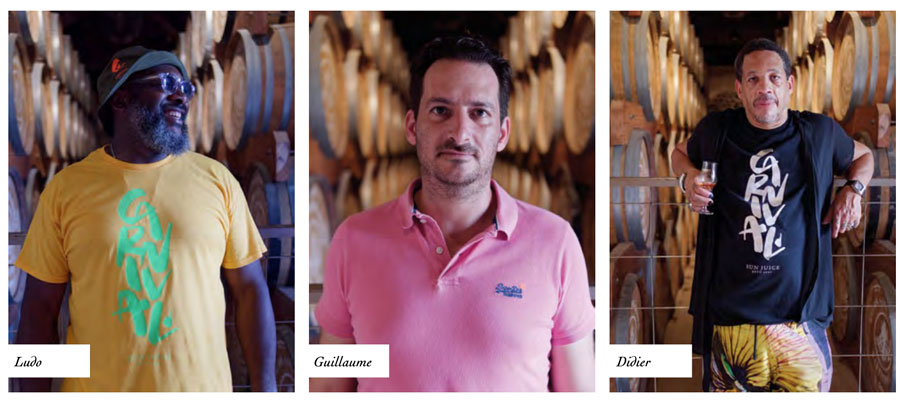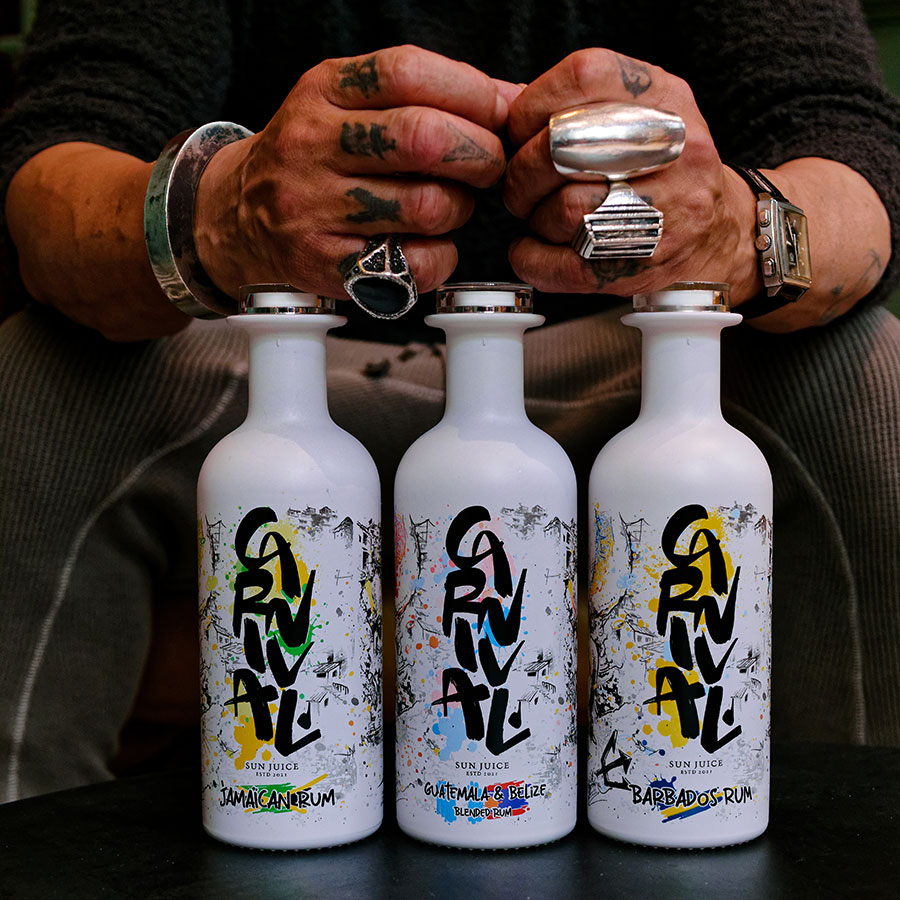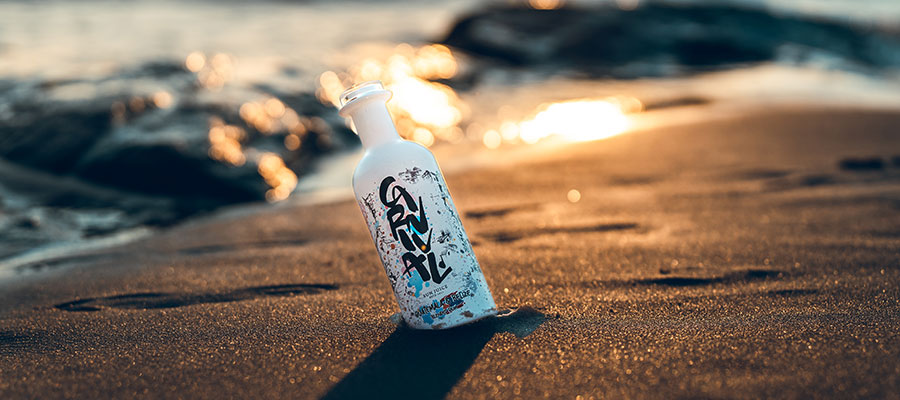It was at Le Mimosa, a bar-restaurant overlooking the courtyard of the Hôtel de la Marine (Paris 1er), on one of the only not too rainy days of spring, that we met Didier Morville aka Joey Starr, Guillaume Château and Ludo Kpodar. The three companions displayed a closeness and naturalness that are the hallmarks of true friends. They are also business associates and partners in the new Carnival Sun Juice rum brand. The lively discussion was accompanied by coffees and sparkling water. At one point, a Vaval clairin made its appearance and immediately scented the atmosphere. But we won’t say who ordered it!
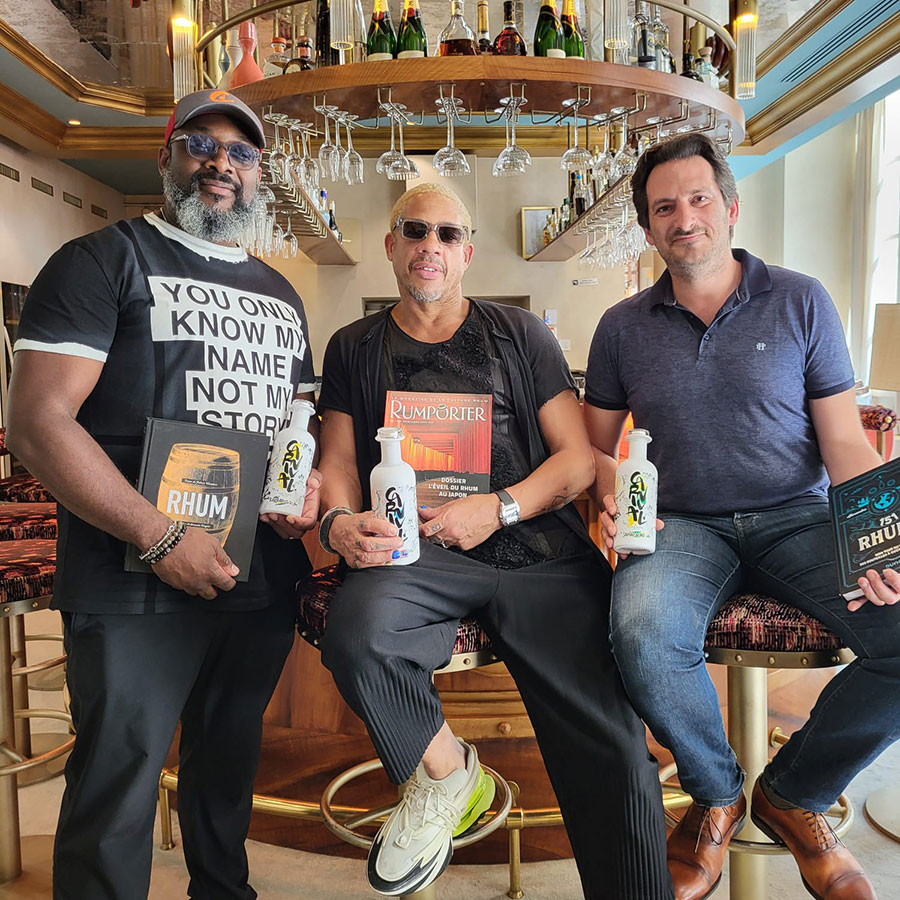
How did your passion for rum come about?
Didier: I came to rum rather late in life. I’m West Indian through my mother and father, who were part of the mass migration to mainland France to help rebuild after the Second World War.
My mother never drank a glass of alcohol in her life, precisely because she didn’t like the image of rum. It’s also linked to a family history. As for my father, he wanted to integrate me by keeping me away from anything reminiscent of the West Indies. His motto was “I’ll be more integrated than the white man”.
My first memories of rum are of evenings spent on vacation in Martinique, with my mother’s family, where the talk was loud. So at the outset, I wasn’t particularly familiar with the rum culture. Even though both my parents are islanders and I’ve spent vacations there, I don’t really have any ties there. I’ve also spent vacations in the Dordogne, but that doesn’t make me a Dordognais!
Ludo: I started with whisky, like my parents. But even though I drank whisky, there were people around me from Martinique and Guadeloupe who drank really sophisticated ti punch. And that’s how I came to rum. I wanted to know what was behind it.
Guillaume: We all come from different backgrounds. For example, I’m basically a wine lover and collector. I also love grape distillates: cognac and armagnac. It’s through them that I came to spirits.
And how did you make the transition from drinker to rum connoisseur?
Didier: I’m not going to tell you about my opioid period. Basically, I used to drink beer. But it was through music that I really started drinking rum. More like white rum. Even today, it’s what suits me best. Whisky and red wine make my head spin. Rum doesn’t, because it electrifies me.
Ludo: I agree!
Didier: When I started out, I drank mainly white Labat. It was called “medicine”. I used rum to make myself a bit electric, a bit like fuel. But as time goes by, you realize that it’s all very well, but you also want to appreciate what you’re drinking. As you get older, you refine your view of things.
Ludo: A bit like wine, in fact. We’ve always had it at the table, but as you get older, you really get to know it and appreciate it. You want to know the grape variety, the region. You refine your taste.
Didier: Absolutely. If today I’ve become a sort of gastronome, if I like good things, if I know how to talk about cooking, it’s partly thanks to this interest that came to me through rum.
To come back to your question, I really got interested when I took part in the Thirsty Road program for Vice in the late 2010s. People thought I was an expert, but now I realize I was an impostor!
That’s where I met the people who make the rum, and they told me stories, and made me understand that there are different kinds of know-how… I discovered that it’s not just the békés who run the distilleries, but also the people who came along and relaunched or founded the distilleries.
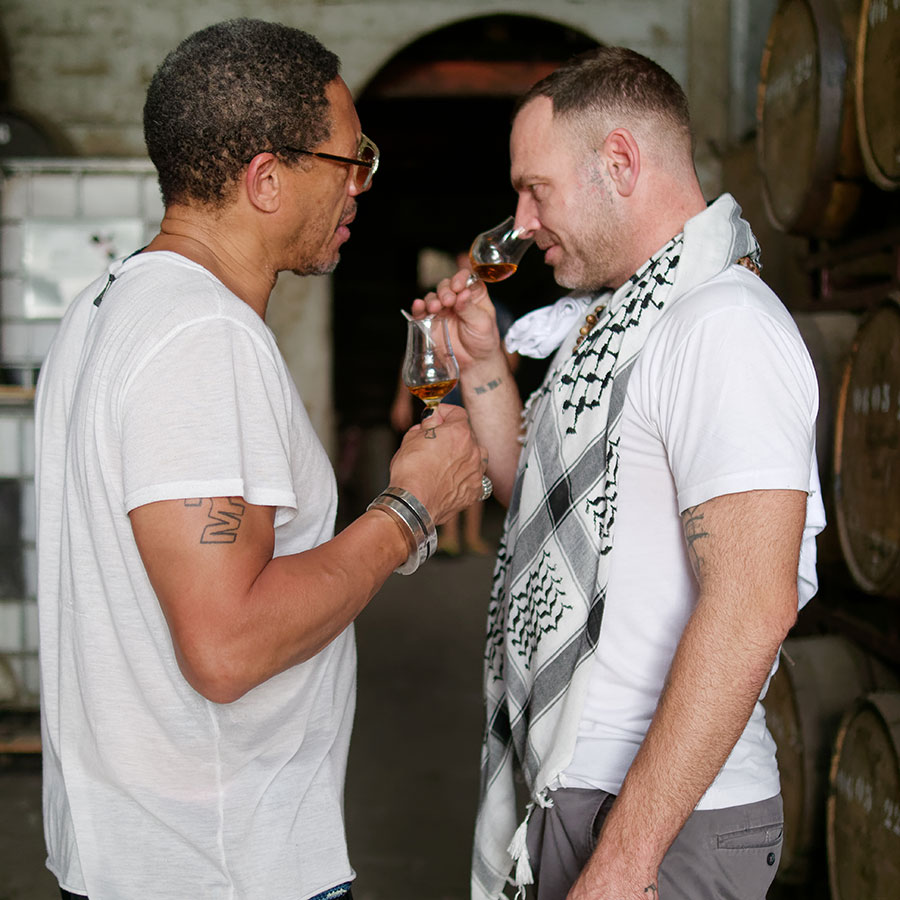
Then you collaborated with Ludo and Anthony Martins (Old Brothers)?
Didier: It all started with Ludo and Anthony meeting in Toulouse for a concert.
Ludo: It was in a restaurant!
Didier: You can’t miss the guy in a corridor! We wanted to do a collab together. That was our first step. The La route de la soif series made me want to go further. To tell my story through my passion for sun juice. My friends and I wanted to tell the story of our travels and encounters, and put them into bottles.
Guillaume: We’re three very different personalities, and our common thread is a love of gastronomy and the pleasure of meeting new people.
Ludo: And life!
Guillaume: Yes, life, doing good, having fun, sharing ourselves and discovering others. When we were thinking about Carnival, Didier said. “I’m a consumer, I’ve become an amateur, I’ve discovered stories, and I want to become a player in rum by sharing those stories. That’s what Carnival is all about, bringing together our stories and our vision as enthusiasts…”
Didier: … dreamers!
Guillaume: Yes, to cross our visions with those of our friends. Each time, we surround ourselves with people who have something to say and who have their own vision of rum. Whether it’s for the blends and selections, for the creation of the bottle decorations, or for Carnival’s sound and image production.
Ludo: Anthony Martins, from Old Brothers, accompanied us on the initial selections. We’ll be calling on other friends for subsequent selections.
Didier: Nilko, a renowned street artist, designed the bottles. DJ Naughty J (editor’s note: one of NTM’s DJs) also created the sounds that appear on our videos, which are themselves produced by Tony, who worked with me back in my NTM days. We do things like a family! Rum is a product of pleasure. But it’s also a political product with a heavy history.
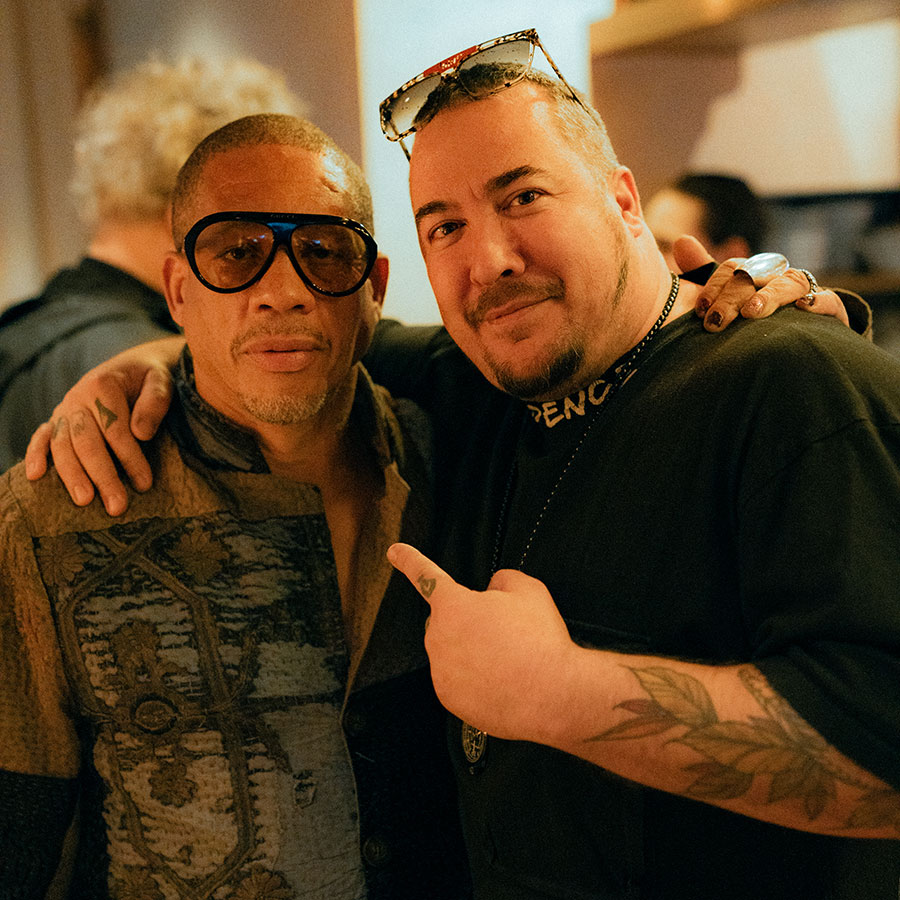
Do you still feel the weight of this history on your travels? I have the impression that it’s still a lot of white people who hold the rum reins in the DROMs, at least economically.
Didier: That’s exactly right. But sorry to say, it’s a reflection of the planet. We’re talking about Martinique and Guadeloupe here, but we’ve also looked elsewhere.
Guillaume: Overall, rum is the history of the world. There are three main influences: French, English and Hispanic, which correspond to the first stages of globalization and colonization.
All these influences are reflected in different ways in the production methods and aromas of the finished products. Each terroir has its own story, even if everywhere there’s the same common thread… blood. Through Carnival, we’re modestly trying to tell this story, our common story in fact.
Why didn’t you include any French rum in your first cuvées?
Didier: Right from the start, when I launched the business, Anthony Martins and I canvassed Martinique and Guadeloupe, but the idea is to help people discover things through our travels. Not necessarily to go straight to the obvious.
Guillaume: Maybe it was too obvious or too simple for our first vintages. On the other hand, we went to Martinique last January. We had some wonderful encounters, and we’re going to want to tell people about them through our cuvées. Great things are coming.
Didier: We’re quite humble in our approach, we know that we’re discovering things as we go along. We’re evolving. First, we source destinations (Jamaica, Barbados) and bottle them. Then we created blends (Guatemala & Belize).
Guillaume: And then, in the near future, we want to start ageing. We’re going to select a few barrels and “help them grow”. We want to try our hand at that too.
And the next logical step is to become a distiller?
Guillaume: That’s getting ahead of ourselves, but yes, we hope that one day we’ll be able to go all the way to distillation.
How do you make your selections?
Guillaume: Carnival is our travel diary, our encounters. As soon as we can, like for Martinique, we go there. You know the rum ecosystem, it’s not always possible because of a certain number of monopolies.
However, we try to focus as much as possible on tropical aging. The main idea is not to buy barrels that have aged exclusively or almost exclusively in Amsterdam or
Liverpool. We’re really after the taste of the tropics.
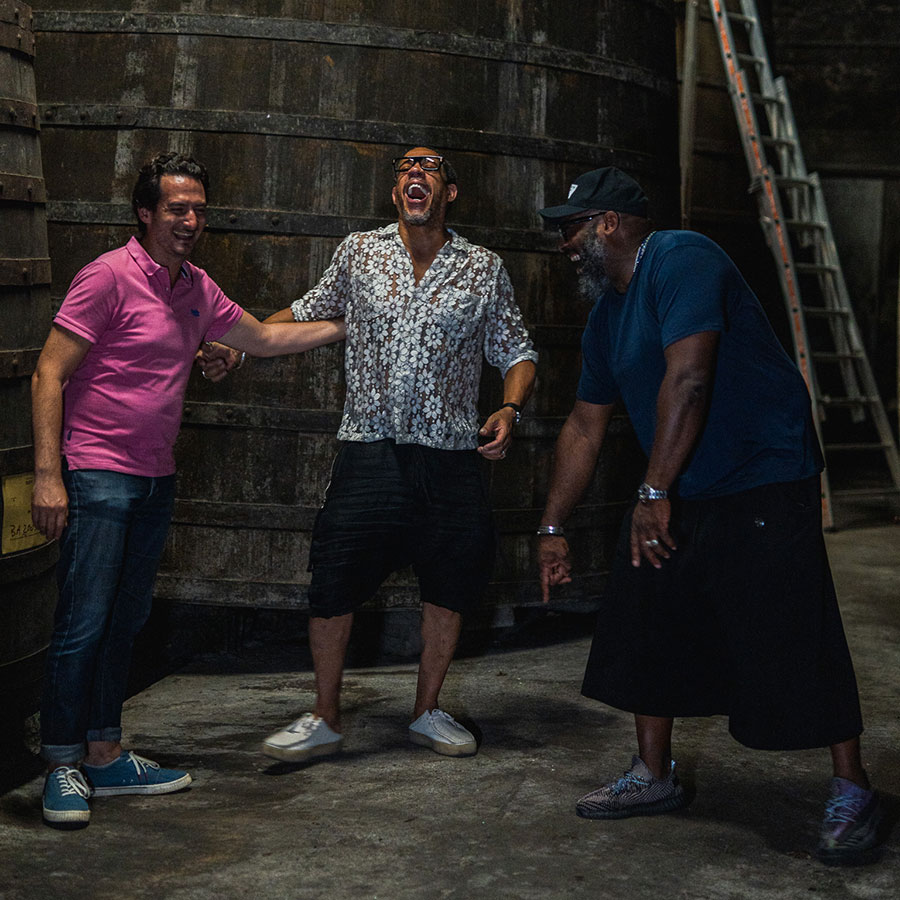
The rums in your range are good, but we get the impression that they’re calibrated to appeal to as many people as possible. Is that the case?
Ludo: The aim isn’t to please as many people as possible, it’s to help people discover.
Guillaume: The key word is sharing. When we chose these three origins, each time we looked for places and people who were producing as close as possible to the traditions of the terroirs they came from. So the idea is to help people discover a terroir.
For example, the 43% Jamaican is accessible, allowing you to immerse yourself in Jamaican style for the first time. With West Indies Barbados, we know that rums can be a little dry. We tried to find roundness, while retaining all the distillery’s aromatic quality on the finish. As we evolve, we’ll be moving into more specialized areas.
For example, we’ll be releasing limited edition single casks at higher proofs. They won’t be as accessible, but they’ll correspond to what we like and what we drink. We’re also currently thinking about a brut de colonne des Antilles…
Didier: … something with watts.
Will there ever be alcohol-free rums in the range?
Didier: Be careful what you say! On a more serious note, we’re not there yet, but it’s not a dirty word. I bought some to play jokes on people. I serve them some without saying anything, they drink, and I say afterwards. Often, they haven’t seen anything and don’t know where to put it!
Ludo: If the aromatic palettes are there and we can find what we’re looking for, why not? So far, we haven’t found one we like.
Guillaume: Actually, we don’t think like that. We don’t say to ourselves, “Well, there’s a trend towards no-low, so we’re going to do it. On the other hand, if tomorrow we meet someone who makes rum without alcohol, why not? In fact, you could ask us if one day we’re thinking of making something other than rum.
I’m the one asking the questions here! On a more serious note, do you think you could make something other than rum?
Guillaume: I’ll give you the same answer: it depends on the encounters. So the subject is wide open! We’re epicures, and we like a lot of different spirits. And we’re keen to put our noses to the grindstone. So yes, it’s possible in the medium term!
OK. I’ve found that rum is a great ice-breaker between people, not necessarily by drinking it, just by talking. Do you also feel that way?
Didier: You’re right about the ice-breaker effect. Rum is both known and unknown, but it arouses curiosity. There’s a postcard effect. For me, it lets me know that there are people working hard in the distilleries to bring out these fine products. Sometimes people are wary of rum, afraid it’s too strong.
My technique is to let them smell it first. And when it’s done right, the nose is incredible. And I tell them: taste, enjoy, don’t drink. I’m a good mass smoker. We’re in an era where people drink shots of tequila or vodka. When they want to do that with a good rum, I tell them “absolutely not!”. Especially as I like rums with watts, so you have to take it easy.
Ludo: Rum is a drink for sharing, a festive drink. That’s also where the name Carnival comes from. Carnival is an event that brings together communities with different traditions, histories and demands. They come together to celebrate.
What are the best rums you’ve tasted?
Didier: I don’t have a favorite color. And above all, I go by mood. But I must admit I have a preference for Jamaican rums. They’re very special, and we’re not all the same when it comes to estheticized rums. I’ve tasted some very nice, rounder things in South America, even if it’s less to my taste. And recently I tasted something really sick at the Rhum Fest.
Ludo: Yes, something incredible, with a banana taste.
It wasn’t a Haribo banana rum, was it?
Didier: Don’t be rude!
Ludo: No, not at all, the real taste of banana flambé combined with rum, and zero sugar! It was made by our friend Michael from Swell de Spirits.
Guillaume: That sums up our approach to rum through encounters. We’ve had some great encounters with Michael Barbaria and the Ricci brothers, among others.
Didier: My background is in music and rap, where you bring out the best in yourself and challenge yourself. Rum is very different. You watch what other people are doing, and you learn from that. You also learn about yourself. We don’t know everything, and we’re not ashamed of it.
Who distributes you, and where can I find your products?
Guillaume: We’re distributed to wine merchants by Premium Craft Spirit. We met Bernard Baud, the president of PCS, at a trade show. It all happened in two hours. We got exposure thanks to Didier, and the ecosystem is curious about who we are and what we do.
Several distributors approached us. We were lucky to have a choice. The choice of Premium Craft Spirit is yet another story of human encounters. We’re also delighted to announce that we’ve just been referenced by V&B’s head office, and that we’re starting our adventure in CHR with BLMHD.
What are your plans for the coming months?
Guillaume: In October-November, we’ll be releasing our first limited editions, each time in unique casks with a beautiful tropical ageing process. For each new cuvée, we’ll invite a friend. For this one, it’s a designer friend, Stéphane Levallois. He drew a magnificent bottle.
Didier: As luck would have it, this release will also fit in well with my current events. It coincides with the release of my graphic novel Super tanker, with five stories revolving around alcoholism. We started from real historical facts (the formation of Australia, Haiti, the Moonshiners…)… There are parallel dimensions, science fiction… One of the scenarios came to me during a visit to Mauritius.
We were shown the size of sugar grains under a microscope. Afterwards, I looked up the head of the rum molecule on the Internet. And I came up with a story called the Hundred Shots War (an analogy with the Hundred Years’ War), where the molasses company gets into a fight with the bagasse company.
Guillaume: We went to Martinique with a three-star chef who is the best craftsman in France, and together we selected a barrel. He’ll be inaugurating our series with star chefs in March. There will also be friends, artists, actors, singers…
Ludo: The chefs already have one foot in rum, they didn’t wait for anyone. Many of them work with it, and have very fine rum cellars. And we also want to invite our friends to join in the adventure. We’re preparing selections and bottle decorations to be created by women.
Didier: So many projects!

